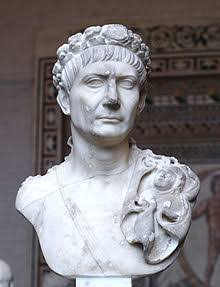.jpg)
The Emperor Trajan was annoyed with Gaius Plinius Caecilius Secundus, governor of the Roman province of Bithynia in Northern Turkey. Why did he trouble him with petty problems? Trajan had enough on his mind without being pestered to send an architect to the new theatre at Nicaea. The emperor scribbled a note to the governor, telling him bluntly: find your own architect.
Stretched to the limit
Trajan, emperor from AD 98 to 117, had only himself to blame if running the empire was getting to much for him. He had expanded it until it reached from the Persian Gulf in the east to Wales in the west, and from Scotland in the north t Egypt in the south. Governing an area peopled by over 50 million speaking dozens of languages was bound to be hard. Fortunately, Augustus, Roman emperor from 4 BC- AD 14, foresaw some of the problems that would arise and devised partial solutions to them when he founded the empire a century before.
The key to running the empire, Augustus believed, was balance. An arch-pragmatist, he set out to find a way of maintaining imperial control while keeping down the cost of governing such a huge area. His solution was to devolve administrative tasks to local level, as far as possible. Accordingly, he divided the empire into 22 provinces, most based on previous native states, or groups of them, such as Lusitania (Portugal) and Cicilia (southern Anatolia). Each province was run by a governor, most of whom were chosen by the Roman Senate, although the emperor himself chose those posted to frontier provinces, such as Dacia, Judaea and Mauretania.
.jpg)
Augustus also tried to balance the provision of enough troops to defend the frontiers with the danger of giving too much power to ambitious generals. As a check on such aspirations, governors were kept in their posts for just three years, too short a time for them to build a personal power base among their command.
To prevent generals buying the loyalty of their troops, army pay and all other financial matters were dealt with by a separate official, the procurator. The governor and the procurator each had a small staff, a junior senator, a few clerks and scribes, a detachment of troops, and the amici- the governor's friends and relatives.
Formidable Efficiency
The Romans kept detailed information on the territories they occupied. This unique plan found at Orange, France, marks roads and land boundaries and was used for tax collection.
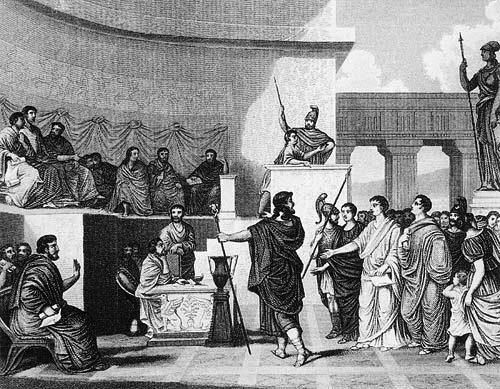
Local Talent
Throughout the empire, magistrates- here seen presiding in court, enforced the will of the local councils from which they were drawn.
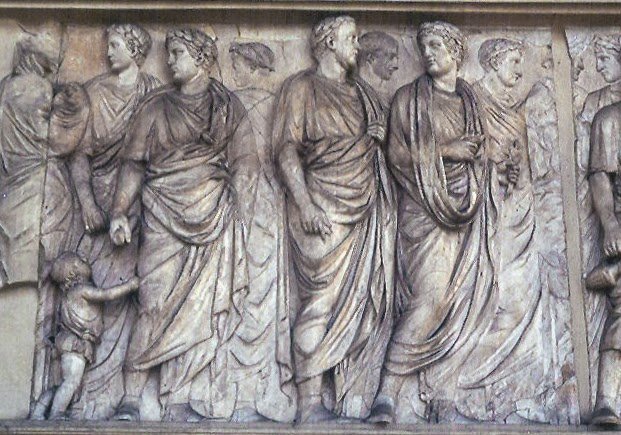
A State Procession
A life size marble sculpture on the Altar of Peace in Rome, shows magistrates, officials and members of the senate.
Encouraging locals to govern themselves
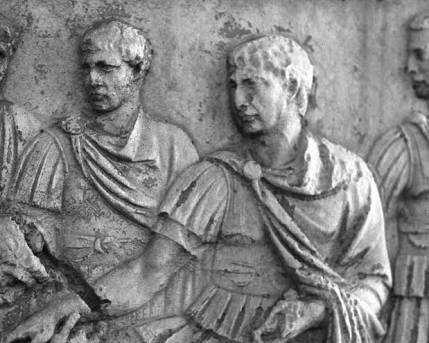.jpg)
In provinces like Gaul and Britain, former tribal states were allowed local self-government under the title of civitas, and cities were developed to act as their administrative centers. All over Britain, capital cities for tribal groups grew up, from Canterbury for the Cantiaci tribe in Kent to Venta Silurum for the Silures in South Wales. Some existing towns were granted self governing status, the title of municipium and a charter- Verulamium (St Albans) and Londinium (London), for example- and the Romans also created new towns, known as colonia, by settling retired legionaires at Glevum (Gloucester), Lindum (Lincoln) and Camulodunum (Colchester), among others.
All these self-governing communities had a similar form of administration. An all-male council, usually about 100 strong, was elected from the free-born citizens of the civitas, municipium or colonia. The council elected two senior magistrates who acted as judges, and two junior ones- the quaestors, who oversaw public works and managed financial affairs.
All roads lead to Rome
.jpg)
The most important function of the quaestors was the collection of taxes, which were assessed on the basis of a five-yearly census. The quaestors were primiraly concerned with registering people for the tributum capitis (poll tax), and with registering property for the tributum soli (land tax).
Tax collection was generally contracted out to private agents known as 'tax farmers', a system which was sometimes subject to bitterly resented abused. In Britain, the greed of procurator Catus Decianus was a major grievance of the Iceni tribe in East Anglia, leading to the tribe's bloody rebellion in AD 60 under their queen, Boudicca.
Different parts of the empire were linked by a sophisticated communications network. An imperial courier system made full used of the roads linking all the towns in province to the provincial capital. Stations and inns every 25-50 km provided the couriers with a change of horses and a place to stay overnight. This efficient system enabled the emperor in Rome to keep a close eye on all matters that interested or concerned him.
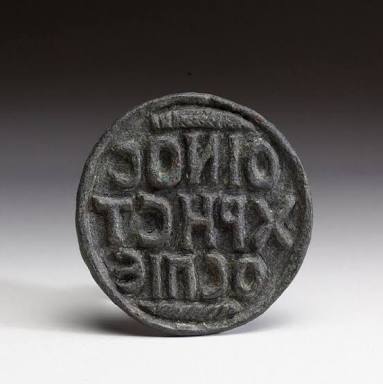.jpg)
Stamp Of Authority
London was the largest center of administration in Roman Britain and housed the offices of the procurator, who made his mark with this stamp.
Legal Complexities
The Romans introduced their complicated legal system to all provinces, thereby creating lucrative business for lawyers. Civil cases, which included theft and fraud- were tried by locally elected magistrates and were generally heard in the hall of the local government building.
.jpg)
From Pillar To Post
A fast courier system- the cursus publicus, conveyed messages and officials alike around the empire on horseback or in horse-drawn carts.

Hi @iknowhow, I'm promoting this idea of creating a /s/History Substeemit. So that original content like this becomes more findable.
It's a collection of well-produced content on history that I personally curate (yes a human, no bots or algorithms or stuff like that.)
I've added this post to the curation list. Next time you write about history make sure you promote that on the comment section on the most recent /s/History substeemit so I can see it.
Hopefully that way people will look up "/s/History" and find quality articles on history like this one.
Thanks for playing the quality game.
@achraf7b (if interested, I talk about the whole idea here in details)
Downvoting a post can decrease pending rewards and make it less visible. Common reasons:
Submit